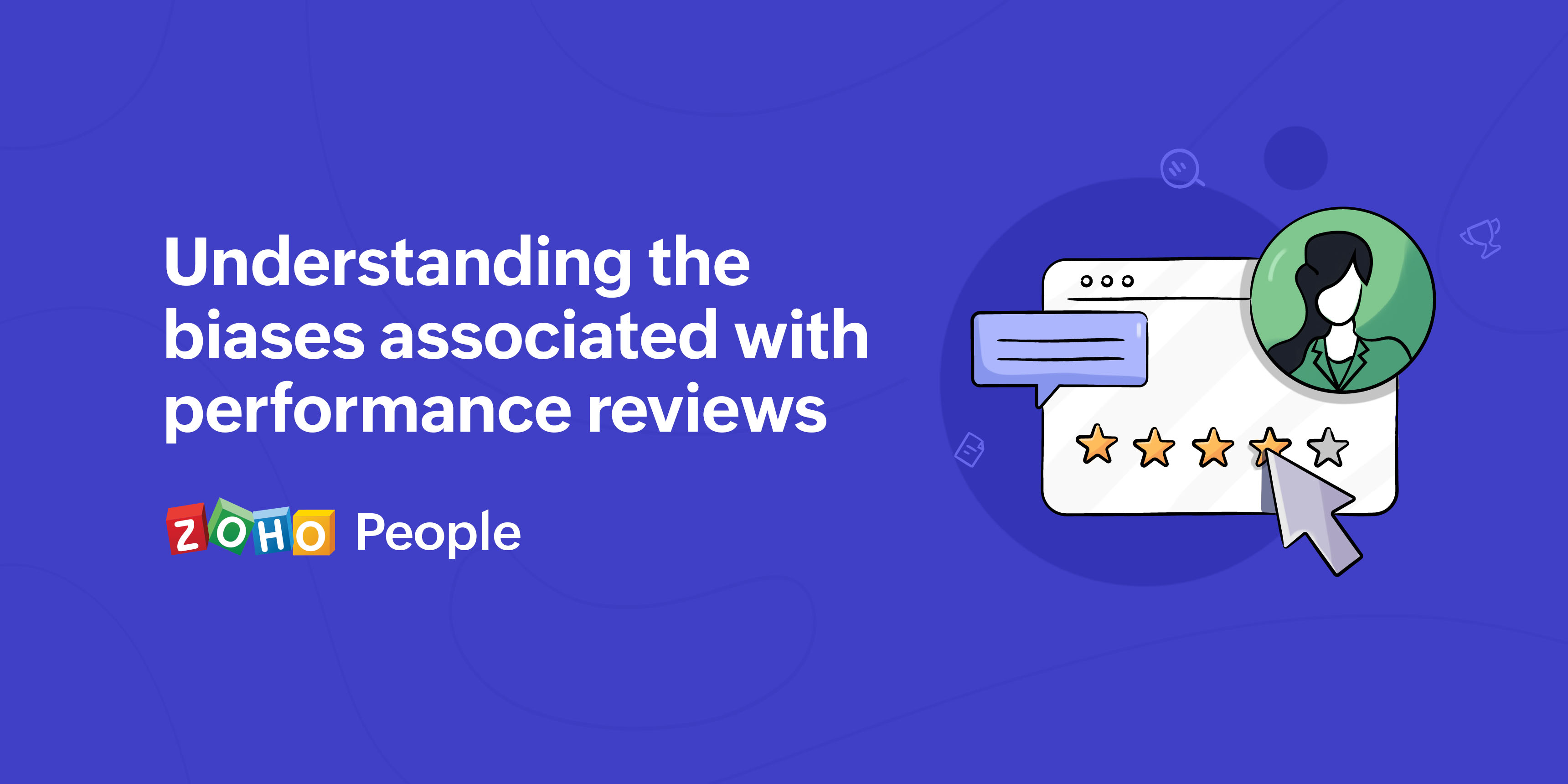- HOME
- HR insights
- 6 unconscious biases that impact performance reviews
6 unconscious biases that impact performance reviews
- Last Updated : January 8, 2026
- 1.9K Views
- 4 Min Read

Performance reviews help employees understand their strengths and weaknesses so they can improve the quality of their work. Letting our unconscious biases influence employee ratings and feedback defeats the purpose and prevents us from getting a clear picture of employee performance levels. When employees sense that they are not being managed fairly, they lose trust in your organization and their morale goes down. The first step to providing objective reviews is to understand the different biases that can affect your judgment when evaluating an employee's performance and take conscious steps to avoid them.
Here are six unconscious biases that every performance rater should be aware of:
Recency bias
Recency bias occurs very commonly while conducting performance reviews, as managers tend to rate employees based on their recent performance. They usually don't take into consideration how employees managed their work responsibilities during the entire performance review period. This can be a serious threat to the whole performance review process. For instance, if a high-performing employee is not able to perform well during the end of the evaluation period due to valid reasons, they may end up getting average or even bad ratings. The same effect can occur if there's a particularly low-performing employee who has recently reached average productivity levels. To overcome this bias, encourage your managers to maintain a summary of employee work quality and achievements that can be referenced during performance reviews.
Proximity bias
With hybrid and remote working models becoming more and more popular, managers may experience proximity bias. This means managers could provide better ratings and high-impact tasks to team members they regularly interact with in person. They may even assume that employees who are working outside of the office are less productive. Help managers overcome proximity bias by pushing them to initiate meetings and catch-up calls with their remote and hybrid employees more often. Managers could also ask those employees to send a report on how they are progressing with their tasks every 15 or 30 days. Setting goals and going over them periodically will also help.
Gender bias
Gender bias in performance reviews still exists, as individuals may unconsciously fall into the trap of stereotypes. For instance, women who are very self-confident and talented may often come across to others as rude, whereas the same traits and attributes may be recognized and appreciated in men. To overcome this bias, it's essential to keep managers informed about the different gender-biased performance practices that exist in the workplace. Additionally, encourage managers to adopt a 360-degree feedback system, wherein they collect feedback from everybody an employee has worked with. Receiving different perspectives about an employee's performance will truly help them provide unbiased ratings and feedback.
Similar-to-me bias
The similar-to-me bias occurs when performance raters implicitly provide better ratings to employees who are very similar to them. Managers may favor employees if they share a connection through interests, language, religion, ethnicity, gender, skill sets, and educational qualifications. This bias could even prevent high-preforming individuals from receiving the recognition they deserve because they are not similar to their managers. To overcome the similar-to-me bias, build a set of objective, performance-based questions for managers. The questions may look like the following:
How have your team members progressed toward their goals?
What are the skills they've developed in this performance period?
What are some of their noteworthy achievements in this performance period?
What are some of their new initiatives?
Contrast bias
Performance raters experiencing contrast bias tend to compare employees with a particular high-performing employee, rather than seeing employees as unique individuals with their own strengths. This is unfair for the employees whose core merits will never be recognized and drawn upon. To ensure that this bias doesn't affect your performance reviews, define a set of performance standards that managers can use to evaluate their team members. Establishing performance metrics like work quality, time management, willingness to gain new skills, and overall productivity rate could also be helpful. Check out this blog post to understand some of the common performance metrics for evaluating employee performance fairly.
Leniency bias
Leniency bias occurs when managers are extremely easygoing while evaluating employee performance. Instead of considering every aspect of performance and providing constructive feedback to their team, these managers tend to provide higher ratings to every employee, irrespective of their performance. The flip side of this type of bias is severity bias, where managers provide lower ratings, no matter how much their employees go out of their way to improve their performance. If you believe a set of employees is receiving this kind of feedback, talk to the manager and make them aware of what they are doing. Help them set a standard performance process that more objectively evaluates employees based on their progress, skills, competencies, and KRAs .
How Zoho People can help you conduct fair reviews
Zoho People, our HR software, comes with a powerful performance management system that helps organizations follow a standard process for running appraisal cycles. For instance, while creating an appraisal cycle, you can receive self-evaluations from employees to understand how they perceive their own performance. Similarly, you can receive feedback from everybody the employee has worked with to understand their true strengths and weaknesses. You can also set goals during the beginning of the performance period and track the progress. All of these steps will help you ensure that your employees are evaluated fairly and accurately. Learn more about Zoho People's performance management system!
 Tarika
TarikaContent Specialist at Zoho People


